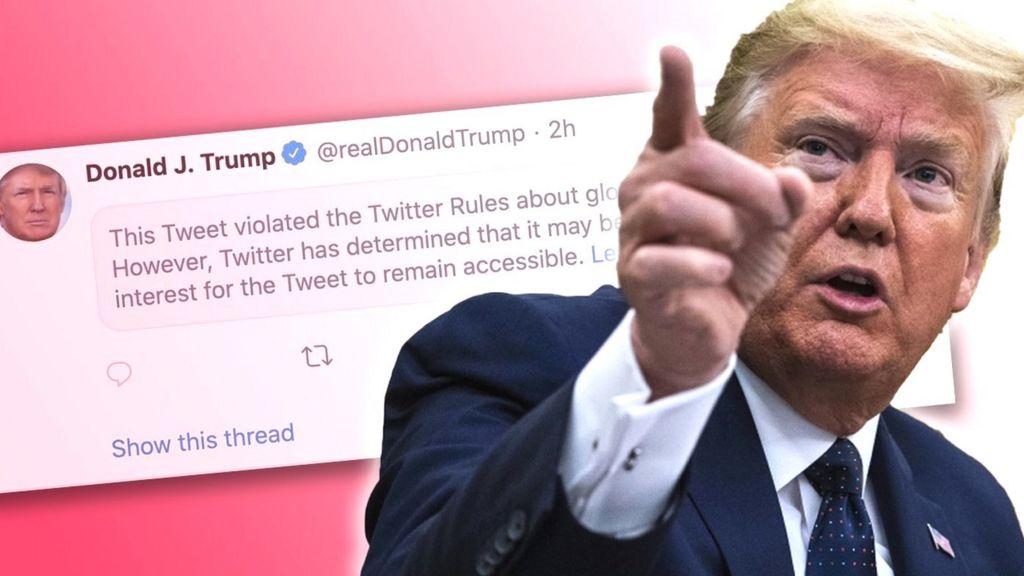
The social networks have taken exceptional albeit temporary measures to deactivate Donald Trump’s accounts. The tech giants will probably be faced with harsher legislation in the coming months.
History will tell if Jan. 6, 2021 will mark a turning point in the regulation of social networks. In the heat of the moment, the measures taken by Twitter and Facebook are without precedent: The two platforms suspended Donald Trump’s accounts, accusing him of inciting violence. The decision, as spectacular as it is temporary, will restart the debate over the quasi-impunity the social networks enjoy. Now in control of both the House of Representatives and the Senate, Joe Biden will be under pressure to try and regulate the online platforms.
Thursday morning, Trump’s Twitter account, followed by more than 88 million people, was reactivated again after a 12-hour suspension. “We have required the removal of three @RealDonaldTrump Tweets that were posted earlier today for repeated and severe violations of our Civic Integrity policy,” the social network stated. As a direct consequence, the incumbent’s account was temporarily suspended. On Wednesday, Trump repeated his claims about fraud in the presidential election, and called the people who attacked the Capitol patriots.
Very Short-Term Measures
Facebook quickly followed Twitter’s example and suspended Trump’s account for 24 hours. “We’ve assessed two policy violations against President Trump’s Page which will result in a 24-hour feature block,” the social network confirmed. Both the site led by Mark Zuckerberg and Twitter had previously taken less severe actions, notably taking down videos in which the president speaks of “a stolen election,” or limiting the visibility of some of his tweets. YouTube, a subsidiary of Google, has also deleted certain videos.
So much for the very short term, with some exceptional measures like temporary suspension and more usual measures like limiting the distribution of tweets. Since last November, Twitter has moderated certain presidential messages by hiding them or adding a warning label. But all it takes is an extra click to view his tweets.
The Battle over Section 230
An intense battle over the law known as Section 230 is expected in the foreseeable future. Adopted as part of the 1996 Communications Decency Act, the primary goal of which was to regulate online pornography, Section 230 also protects Twitter and Facebook. These networks are considered to be hosts and are not responsible for the contents that third party users publish. Nor can the social networks be sued over the shared content. Twitter, Facebook and all the other social networks only have one obligation: to remove content that is considered to be illegal within an acceptable time frame.
Trump’s supporters want Section 230 to be updated as much as the Democrats. So far, Biden has not been explicit about his intentions, but has simply stated that the law should be revised to include all hate speech, all extremist content and all attempts to manipulate election results. In 2019, House Speaker Nancy Pelosi declared that Section 230 was a gift to the tech giants, asserting that it should be abolished.
Awkward Democrats
The problem is that the Democrats haven’t said, and likely don’t know, how to reform a law which is seen as having allowed the American tech giants to benefit. During hearings before Congress last year, Zuckerberg reluctantly suggested that Section 230 should be revised, especially with respect to clarifying the rules. In particular, Facebook relies heavily on its own “supreme court” to decide contentious cases. But that newly created external body doesn’t act quickly. For his part, Trump has continued to demand the revision, or rather the repeal, of Section 230 because he believes social networks favor Democratic views.
Now in control of both houses of Congress, Biden should give some indication of his intentions for the possible regulation of social networks in the coming months, if not the coming weeks. The tech giants will fight Biden’s decisions vigorously if they consider them to be too restrictive. But the president-elect has a trump card: The antitrust investigations that are multiplying against Google and Facebook will no doubt make these giants less combative, and they will no doubt be inclined to accept a regulation that they consider to be moderate.
Worry over Encrypted Messages
People are beginning to ask another question about alternative social networks and encrypted messaging. In the last few weeks, the network Parler, championed by Trump’s supporters, has also gained stature. At the same time, a number of discussions, sometimes containing calls for violence, have begun among the outgoing president’s supporters on Telegram and other encrypted messaging systems. The contents are only accessible to users invited to the messaging services, and cannot be read by companies that manage them, or the authorities.*
*Editor’s note: This article may have been updated and/or modified since its original publication.

Leave a Reply
You must be logged in to post a comment.